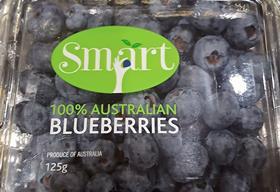
Great tasting blueberries, raspberries and blackberries are at the centre of Smart Berries.
Formed in 2013 as a partnership between Sydneybased vertically integrated company Fresh Produce Group (FPG) and Brisbane-based wholesaler Pascoes, Smart Berries has since expanded its berry plantations from Queensland to New Zealand, and in-between, supplying retailers, independents and export markets.
FPG executive director and Smart Berries CEO Anthony Poiner told Fruitnet that under the vertically integrated model of the business, about two-thirds of the berries are grown in-house, controlling everything from the varieties produced to the marketing of the end product.
“We start out with a view as to what really good varieties we can have, and control, and look to match that all the way through to getting a good experience with the consumer,” Poiner said.
For blueberries, Smart Berries is concentrating on southern highbush varieties and producing berries during the autumn to early summer period in Queensland, Tasmania, Western Australia and eventually New Zealand.
“We’re not only looking for a good sized berry, but also a crisp berry with really good flavour that eats well and that consumers like,” Poiner said, adding that both Australian consumers and consumers in export markets across Asia are kept in mind when developing different strains of blueberries.
As for raspberries, Poiner sees Tasmania as a great place to grow high-quality, sweet and structurally strong berries.
“The last season gone was our first real effort at growing raspberries in Tasmania, as well as Western Australia, and it’s been largely successful,” Poiner said. With blackberry material often classified as a weed by the Australian government, the industry has faced challenges in importing new material, however, Smart Berries has secured the rights for California-based Plants Sciences’ breeding programme, and has begun planting new imported varieties.
“Blackberries, when marketed, often look fantastic but sometimes they’re not sweet. Now, with these newer varieties, we’re starting to grow good fruit, which gives us the opportunities to invest time and energy into growing in different locations,” Poiner said. “We expect out first crop of the new blackberries next spring.”



